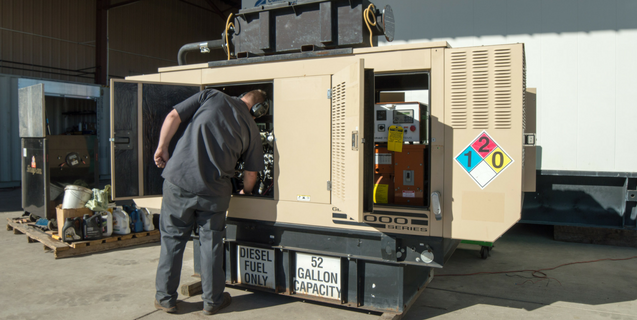When a backup generator is not being properly cared for, there are several reasons that it may not start.
These complex machines are vital to your business in the event of an unexpected outage, but they also require regular maintenance if you want to keep them in top shape.

If your genset is having problems, it might be one of these common issues.
Your Battery Is Dead
A dead battery is the single most common problem with generators. More often than not, battery failure will require partial or complete replacement to solve the problem. Experts recommend replacing your battery every three years to avoid issues. To maximize the life of your battery, follow these recommendations:
-
Consider your needs and applications of the battery
-
Purchase the correct battery size
-
Schedule regular battery maintenance
-
Monitor your battery and maintain manufacturer guidelines
Your Fuel Level Is Off the Mark
Nearly all gensets have built-in alarms to mark fuel levels that are either too high or too low. Most people can figure out the solution to low fuel levels — just add more fuel to your generator. But a high fuel alarm may be a bit bewildering for new generator owners.
Usually, there’s nothing to worry about with this alarm; it should clear itself when the fuel level drops below the high-level mark. But be aware that some gensets may require you to manually reset the alarm.
You Have An Oil, Fuel, or Coolant Leak
If your genset is leaking, the best thing to do is call a qualified technician to come and patch or replace the necessary components. However, your generator can sometimes register a leak when in fact there is no leak at all.
This happens when your generator isn’t running regularly enough. When that happens, carbon particles, unburned fuel, lube oil, condensed water, and acids in the exhaust system can accumulate in a process called wet stacking. When that happens, you simply load the unit for a few hours, until the surplus debris burns off.
There’s Air in the Fuel System
Even a small bubble of air in an injector can prevent startup. If enough of your injectors don’t fire on ignition, then your generator’s engine won’t start. In older models, this means that there’s often a leak in your line. On the other hand, because modern generators have often been more finely calibrated, they’re more susceptible to air negatively affecting startup.
Air in your fuel system is easily avoided by simply running your generator for about 5 minutes every week to verify that your engine will start. This will ensure that any air is cleared from the system and that the voltage and frequency are operating at the levels you need them to.
Your Auto-On Feature Is Off
Rarely, your generator won’t start because its auto controls have been left in the “Off” position after a routine test or inspection. Make sure that you not only keep an eye on this personally but that you understand the various functions and settings that might trip a “not in auto” alarm on your generator.
Generator Source Is the Key to a Finely Tuned Generator
More than any other solution to one of these problems, regular preventive maintenance can ensure that your generator is ready to work when you need it. Want to take the guesswork out of owning a generator? It’s as simple as making one call to the pros at Generator Source, where we can handle every one of your generator’s needs.
From purchase to installation to maintenance, Generator Source is the team you can trust.
If our handy solutions can’t fix your problem, then contact Generator Source, where our skilled technicians can troubleshoot any generator issue you might have.
>>Back to Articles & Info<<